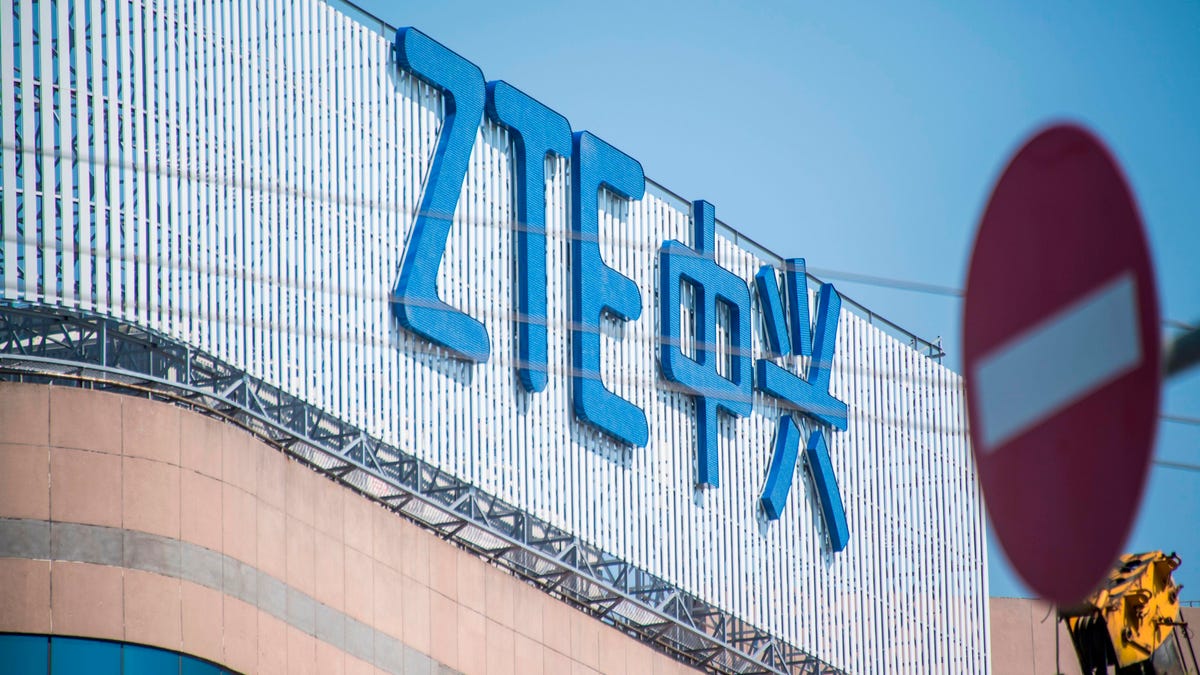ZTE will reportedly pay total of $1.7B to lift US Commerce Department ban
The Chinese smartphone maker may be back in business, thanks in part to President Donald Trump.

Chinese telecom giant ZTE said its major operations had ceased following last month's US ban on American sales of critical technology to the company.
Embattled Chinese telecommunications manufacturer ZTE may be alive after all.
The company has agreed in principle to a settlement that would lift the Commerce Department ban preventing US companies from doing business with ZTE, according to a Reuters tweet on Tuesday. In exchange, ZTE would have to pay a total of $1.7 billion in penalties, according to the the report. The preliminary deal includes a $1 billion fine and $400 million in escrow in case of future violations. This comes on top of the $361 million ZTE had already paid under the original settlement, according to Reuters.
On Thursday, US Commerce Secretary Wilbur Ross officially confirmed the deal. (You can read our new story here.)
The ban had been put in place for ZTE's failure to see through the proper punishment for doing business in Iran and North Korea, and it had proved crippling, forcing the Chinese company to shut down major operations. ZTE seemingly had little hope of survival until President Donald Trump tweeted that he was pushing the Commerce Department to work with ZTE to remove the ban -- an unprecedented move by a US president to countermand one of his own departments.
Members of Congress on both sides of the aisle criticized Trump's tweet as irresponsible, prompting him to defend his position with yet another tweet. ZTE, the fourth-largest smartphone maker in the US by market share, "buys a big percentage of individual parts from U.S. companies." He also said ZTE was "reflective of the larger trade deal we are negotiating with China and my personal relationship with President Xi."
On Tuesday, Charles Schumer, a Democratic senator from New York, tweeted that the deal shows Trump put China, and not the US, first. "The president who roared like a lion is governing like a lamb when it comes to China," he tweeted, calling for Congress to take action.
If these reports are true, @realDonaldTrump has put China, not the United States, first. By letting ZTE off the hook, the president who roared like a lion is governing like a lamb when it comes to China. Congress should move in a bipartisan fashion to block this deal right away. https://t.co/ehRxD8b8bl
— Chuck Schumer (@SenSchumer) June 5, 2018
Mark Warner, a Democratic senator for Virginia, expressed his concerns over the deal.
"If these reports are accurate, this is a huge mistake," he said in a statement. "ZTE poses a threat to our national security. That's not just my opinion -- it's the unanimous conclusion of our intelligence community."
A spokesman for the Commerce Department said that no definitive agreement has been signed. A ZTE spokeswoman declined to comment.
The Commerce Department denial order prevented ZTE from utilizing key technology from US suppliers like Qualcomm and and Broadcom, making it difficult to produce smartphones or telecommunications equipment. It also prevented the company from accessing core parts of Google's Android software, including the Google Play store.
ZTE has become a critical part of the broader discussions between China and the US, the two largest economies in the world, over trade tensions and whether the two countries can prevent a trade war that could involve billions of dollars' worth of tariffs.
Trump's support of a Chinese company was a surprising turn for someone who has made saving US jobs a marquee aspect of his presidential platform. It also stands in contrast with the manner in which the president has used to Twitter to attack companies he doesn't like, including Amazon, whose CEO, Jeff Bezos, who also owns the Washington Post, which has been critical of Trump.
Like fellow Chinese phone maker Huawei , ZTE has also been dogged by security concerns and its ties to the Chinese government. But unlike Huawei, ZTE had a firm presence in the US, selling mostly budget phones at prepaid carriers. But its folding Axon M phone was sold at AT&T , the nation's second-largest carrier.
The story originally published at 1:12 p.m. PT.
Update at 1:45 p.m. PT: To include further background and response.
Update, June 7 at 8:42 a.m. PT: Linking to new story that the deal is official.
Solving for XX: The industry seeks to overcome outdated ideas about "women in tech."
Tech Enabled: CNET chronicles tech's role in providing new kinds of accessibility.

